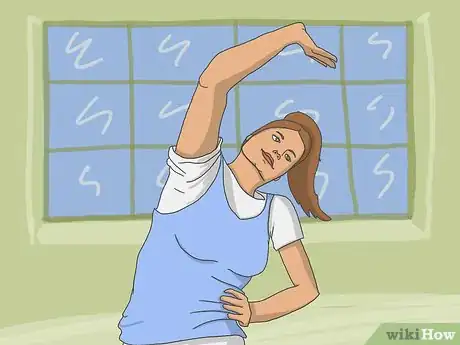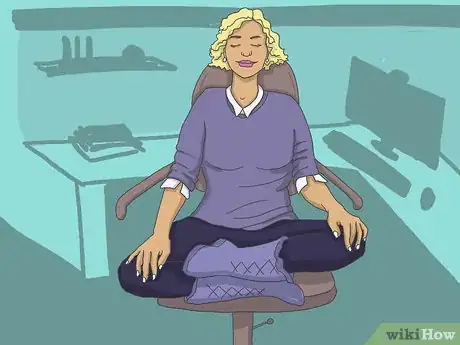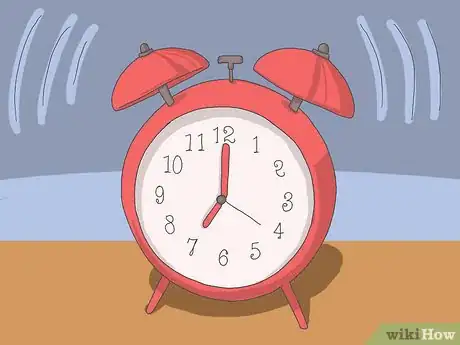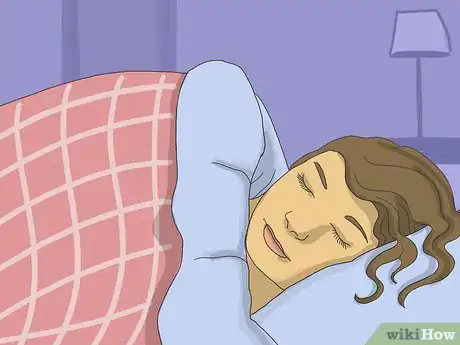This article was co-authored by Marc Kayem, MD. Dr. Marc Kayem is a board certified Otolaryngologist and Facial Plastic Surgeon based in Beverly Hills, California. He practices and specializes in cosmetic services and sleep-related disorders. He received his Doctorate in Medicine from the University of Ottawa, is board certified by the American Board of Otolaryngology, and is a Fellow of the Royal College of Surgeons of Canada.
There are 9 references cited in this article, which can be found at the bottom of the page.
wikiHow marks an article as reader-approved once it receives enough positive feedback. In this case, 86% of readers who voted found the article helpful, earning it our reader-approved status.
This article has been viewed 233,546 times.
Sometimes we are forced to run with little or no sleep. If you're struggling to get through a workday with low energy, there are steps you can take to keep focused and alert throughout the day. You should also strive to energize early in the morning and take steps to eliminate fatigue long-term.
Steps
Staying Awake Throughout the Day
-
1Exercise. If you're feeling sleepy, some brief exercise can help wake you up. Physical activity increases blood flow to all parts of the body, resulting in you feeling more energized overall.[1] Studies show that you are more productive after exercise.
- If you have time to hit the gym mid-afternoon, do so. You may have to slow down on your regular workout routine due to energy deprivation, but any amount of physical activity can help you recharge for the remainder of the day.
- If you're stuck at work, try taking a short walk during your lunch break or doing some light stretches at your cubicle.
- Strive to get at least 30 minutes of exercise in mid-afternoon for the best results and the most energy
-
2Try caffeine. A cup of coffee in the morning or mid-afternoon is a go-to for many for a reasons. Caffeine is a powerful stimulant that can wake you up and help you stay alert throughout the day.[2] [3]
- People have a substance called adenosine in their brains that binds to nerve receptors, which slows down nerve cells and causes drowsiness. The brain mistakes caffeine for adenosine and receptors bind to it instead. Instead of slowing down nerve cells, caffeine speeds up nerve cells resulting in your feeling energized.
- Timing is important when it comes to caffeine consumption. It takes about 20 or 30 minutes for caffeine to start working, so aim to have a cup of coffee right before your afternoon meeting.
- Doctors recommend you only consume 400 milligrams of caffeine a day, and an eight ounce cup of coffee has about 100. Keep this in mind as you consume caffeine so you don't go overboard.
Advertisement -
3Eat energy rich foods during lunch. If you're feeling fatigued, it's best to skip a heavy lunch and instead eat a small meal packed with energy-rich foods.[4]
- Sleep deprivation can affect ghrelin and leptin, which are the hormones responsible for controlling hunger. This means when you're tired, you may have an increased appetite and crave high-calorie, high-carb foods. However, the way refined carbohydrates like white breads and white pastas work cause a sudden spike and then drop in blood sugar, leaving you feeling sleepy shortly after eating.
- Instead, stick to healthy, whole grain carbohydrates and fruits and vegetables. For lunch, try a small salad with nuts and a small piece of whole grain bread. You could also try something with lean protein, like fish, along with some greens and fruit.
-
4Practice mini meditation. Engaging in brief periods of meditation can help you re-energize during the day by momentarily relaxing your mind and body.
- Try to aim for five minutes of meditation towards the middle of the day, when you're most likely to have a dip in energy.
- Lie on the floor with your arms on the floor and your legs on a wall. Move from focusing your mind on one part of the body to another, relaxing as you go.
- If it's hard to lie down, you can simply stay in your chair and pull your calves and feet up to the seat. Raising your legs can alter blood flow and help energize your body.
Waking Up when Sleep Deprived
-
1Get up as soon as your alarm goes off. If you wake up after only a small amount of sleep, it might be tempting to hit the snooze bar and enjoy an additional seven or nine minutes of rest. However, this will actually result in you feeling more tired in the morning.[5]
- The sleep you have during those few minutes are of minimal quality. You end up going straight back into REM sleep if you're pulled from sleep too quickly, and the shock of waking from REM sleep repetitively leaves you more tired than you would have been if you had simply woken up.
- It's better to set the alarm as late as you can possibly sleep and get up and get going on the first buzz. Even if it's hard, you'll end up feeling more energized throughout the morning.
-
2Eat breakfast. Eating breakfast within 30 minutes of waking up will improve your cognitive performance and overall energy throughout the day.[6]
- Once again, if you're tired you'll crave simple carbohydrates and sugar, but you should strive for a healthy, energy boosting breakfast instead.
- Choose whole grains and fruit for breakfast. Have yogurt with berries and granola or oatmeal with fruit.
-
3Step outside. Try to get outside for a few minutes shortly after you wake up. Sunlight will help energize you, even if you're running on a small amount of sleep.[7]
- Bright, natural light boosts energy and body temperature. It'll also stall your circadian rhythm, slowing the urge to get back in bed.
- Do not wear sunglasses. Sunglasses block the UV lights that you need to energize
Preventing Fatigue Longterm
-
1See a doctor. If you're prone to fatigue, you should make an appointment with your doctor to rule out potential medical problems.[8]
- Iron-deficiency, anemia, and hypothyroidism can all cause chronic fatigue and can be diagnoses with a simple blood test. If you're diagnosed with one of these disorders, your doctor can prescribe medication to lessen symptoms, including fatigue.
- If you have trouble sleeping, your doctor may able to prescribe or suggest a safe sleep medication or herbal supplement to encourage sleep.
-
2Check your medications. Look through the medications you're currently taking and see if any of your meds may be causing your fatigue.[9]
- Many prescription drugs include fatigue in their possible list of side effects. If your dose is too high, fatigue is more likely. If you think a medication you're on is causing you to feel tired throughout the day, talk to your doctor about altering your dosage or managing side effects.
- A lot of psychiatric drugs can cause fatigue. If your tiredness is so bad you're having trouble functioning in your day-to-day life, your psychiatrist may be able to switch you to an alternative med to see if the side effects are less acute.
-
3Practice good sleep hygiene. Developing good sleep habits can help improve the quality and duration of your sleep at night, resulting in less fatigue throughout the day.[10] [11]
- Going to bed and waking up at the same time each day, including weekends, can help you fall asleep and wake up faster as your body will adapt to a schedule.
- Do not use electronics half an hour before bed, as the light generated by laptops, TV screens, and smart phones interfere with sleep. Instead, try a low-key activity like reading or doing a crossword puzzle.
- If your exercise regularly, make sure to time your workouts effectively. Working out within an hour before bed raises adrenaline energy and interferes with sleep.
- Take a warm shower or bath before you go to bed and sip on a light tea, such as calming herbal tea, to help you wind down.
- Try to avoid going to bed hungry and do not smoke before bedtime.
Expert Q&A
-
QuestionHow can I stay awake without caffeine?
 Marc Kayem, MDDr. Marc Kayem is a board certified Otolaryngologist and Facial Plastic Surgeon based in Beverly Hills, California. He practices and specializes in cosmetic services and sleep-related disorders. He received his Doctorate in Medicine from the University of Ottawa, is board certified by the American Board of Otolaryngology, and is a Fellow of the Royal College of Surgeons of Canada.
Marc Kayem, MDDr. Marc Kayem is a board certified Otolaryngologist and Facial Plastic Surgeon based in Beverly Hills, California. He practices and specializes in cosmetic services and sleep-related disorders. He received his Doctorate in Medicine from the University of Ottawa, is board certified by the American Board of Otolaryngology, and is a Fellow of the Royal College of Surgeons of Canada.
Sleep Specialist The more stimulation you're exposed to, the more likely you are to stay awake. Music, bright lights, and moving around will really help keep you from falling asleep.
The more stimulation you're exposed to, the more likely you are to stay awake. Music, bright lights, and moving around will really help keep you from falling asleep. -
QuestionWhat can I do if I always feel sleepy?
 Chris M. Matsko, MDDr. Chris M. Matsko is a retired physician based in Pittsburgh, Pennsylvania. With over 25 years of medical research experience, Dr. Matsko was awarded the Pittsburgh Cornell University Leadership Award for Excellence. He holds a BS in Nutritional Science from Cornell University and an MD from the Temple University School of Medicine in 2007. Dr. Matsko earned a Research Writing Certification from the American Medical Writers Association (AMWA) in 2016 and a Medical Writing & Editing Certification from the University of Chicago in 2017.
Chris M. Matsko, MDDr. Chris M. Matsko is a retired physician based in Pittsburgh, Pennsylvania. With over 25 years of medical research experience, Dr. Matsko was awarded the Pittsburgh Cornell University Leadership Award for Excellence. He holds a BS in Nutritional Science from Cornell University and an MD from the Temple University School of Medicine in 2007. Dr. Matsko earned a Research Writing Certification from the American Medical Writers Association (AMWA) in 2016 and a Medical Writing & Editing Certification from the University of Chicago in 2017.
Family Medicine Physician Try to exercise or wash your face off with water. Coffee is always a go-to standby, but you have to be careful not to have too much caffeine, as this can make it difficult to sleep. You may also want to see your doctor to ensure you don't have a sleep disorder.
Try to exercise or wash your face off with water. Coffee is always a go-to standby, but you have to be careful not to have too much caffeine, as this can make it difficult to sleep. You may also want to see your doctor to ensure you don't have a sleep disorder.
References
- ↑ https://www.nhs.uk/live-well/exercise/5-minute-wake-up-workout/
- ↑ https://my.clevelandclinic.org/health/articles/15496-caffeine-how-to-hack-it-and-how-to-quit-it
- ↑ Marc Kayem, MD. Sleep Specialist. Expert Interview. 24 October 2019.
- ↑ https://www.health.harvard.edu/healthbeat/eating-to-boost-energy
- ↑ https://newsroom.clevelandclinic.org/2019/03/08/is-hitting-the-snooze-button-bad-for-your-health/
- ↑ https://www.heart.org/en/healthy-living/healthy-lifestyle/sleep/how-to-establish-a-wakeup-routine-for-a-good-morning-every-morning
- ↑ https://www.heart.org/en/healthy-living/healthy-lifestyle/sleep/how-to-establish-a-wakeup-routine-for-a-good-morning-every-morning
- ↑ https://www.betterhealth.vic.gov.au/health/conditionsandtreatments/fatigue
- ↑ https://medlineplus.gov/ency/article/003088.htm
- ↑ Marc Kayem, MD. Sleep Specialist. Expert Interview. 24 October 2019.
- ↑ http://www.helpguide.org/articles/sleep/how-to-sleep-better.htm
About This Article
To stay awake when you’re feeling sleepy, try doing a little exercise. Getting yourself moving can increase blood flow to your brain and body, giving you a boost of energy. You can also wake yourself up a little by drinking a cup of coffee in the morning or afternoon. At lunch time, lift your energy levels by eating some nourishing food, like whole grains, fruits and vegetables, or lean protein. If you still find yourself nodding off, give your brain and body a break by meditating for a few minutes. For more tips from our Medical co-author, including how to wake up when you haven’t had much sleep, read on!









































































Medical Disclaimer
The content of this article is not intended to be a substitute for professional medical advice, examination, diagnosis, or treatment. You should always contact your doctor or other qualified healthcare professional before starting, changing, or stopping any kind of health treatment.
Read More...